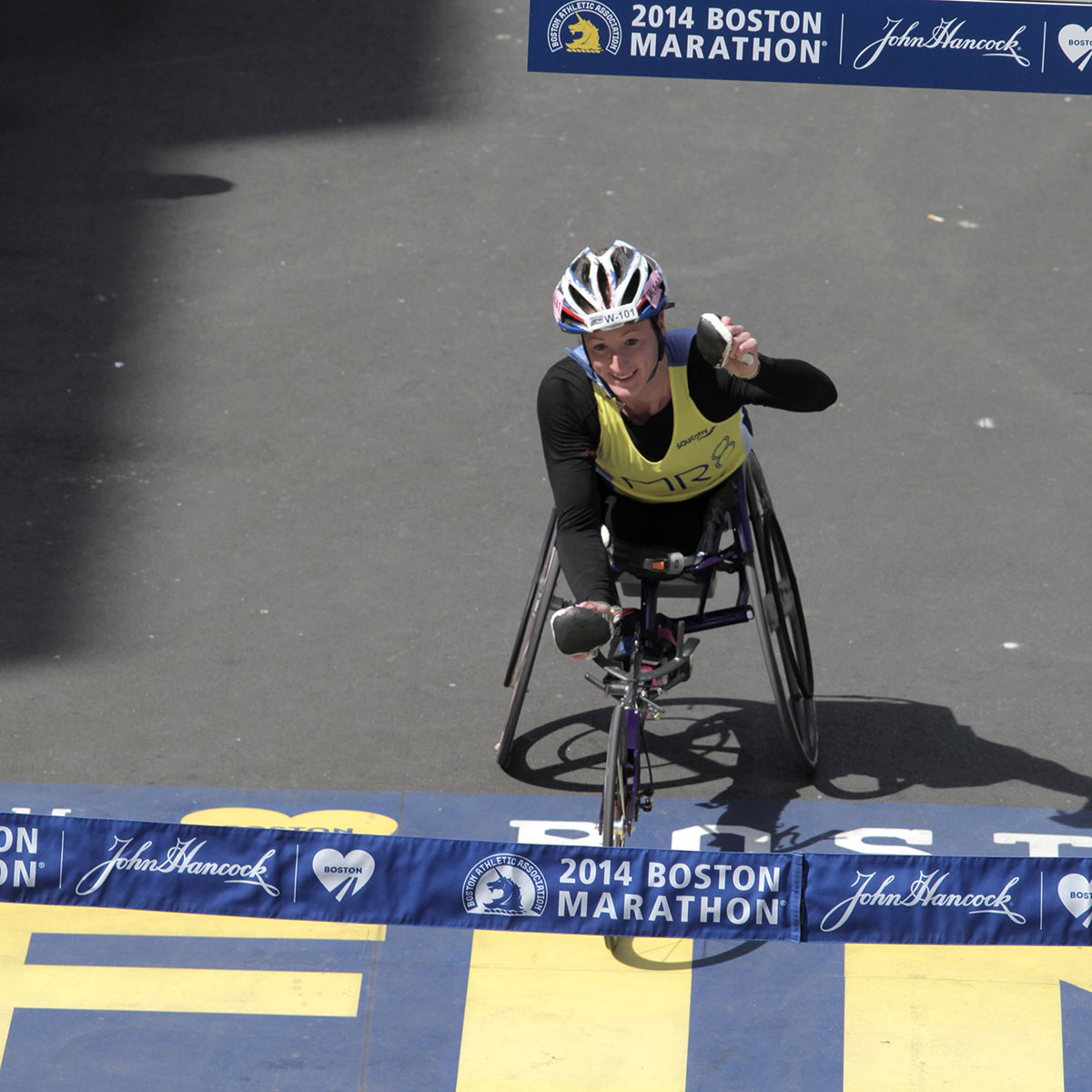Q&A: Tatyana McFadden, Women’s Wheelchair Champion of the 118th Boston Marathon

Tatyana McFadden crossing the finish line for her second consecutive Boston Marathon win. Photo by Olga Khvan.
Tatyana McFadden won her second consecutive Boston Marathon women’s wheelchair race on Marathon Monday, which also happened to be her 25th birthday. She was born in 1988 in St. Petersburg, Russia, with an underdeveloped spinal cord which resulted in paralyzation below the waist and a hole in her spine, a condition known as spina bifida. She grew up in an orphanage that couldn’t afford to get her a wheelchair, and so spent the first six years of her life using her arms as legs and walking on her hands as if they were feet.
McFadden was adopted and brought to the U.S. where she began to excel in sports. She has won Paralympic medals at the Athens, Beiing, and Sochi games (three gold, four silver, one bronze in summer, and one silver in winter) in wheelchair track and field and cross-country skiing. She’s currently a member of the University of Illinois wheelchair racing team and in 2013 became the first woman to sweep the world’s four major marathons in the same year: Boston, London, New York, and Chicago.
The day after winning the big race again, McFadden, a member of Team Liberty Mutual, spent time at Spaulding Rehabilitation in Charlestown, where she met with patients, families, and clinicians to tell her story. Last fall, Liberty Mutual Insurance provided the cornerstone donation of $1 million for the creation and construction of the city’s first universally accessible playground, called Mayor Thomas. M. Menino Park.
While her time was limited, we got the chance to ask her a few questions. Below, our Q&A:
Of all the marathons you’ve competed in, which is your favorite and why?
So far Boston’s been pretty good to me. The first year [2013], I won the marathon and this year I was able to defend my title. The course is really unique with lots of uphills and downhills. I like it because anything can happen. I also really enjoy London because it’s a lot of flat hills and the pack stays so close together. It’s usually a sprint finish.
What kind of training regimen do you have?
Right now I’m getting back into track training for the spring, for the 100 and 200, as well as middle distances for 400 and 800. I’m doing specific trainings for that. For marathon training, it’s a lot of intervals and distance and weight training as well to build the strength in my arms. I’m training all year long, and I think the majority of athletes train all year long. For me it’s really important because I’m a track and a marathon athlete, so I need to keep going all year. From the month of August all the way to November/December, I’m really focusing on endurance, marathon, and strength training.
What is special for you about the Boston Marathon?
Just to get to know the people that ran and get to know their stories was absolutely inspirational. The crowds were huge and no other crowds are like this. We had 99 percent of runners come through, it was just an absolutely a wonderful day. This year was a special marathon because I was really involved with the community and ran for Team MR8, in honor of Martin Richard. On Monday, I promised the Richard family I would run for him and his family. Just to meet Jane [Martin’s sister] and the whole family was an absolute privilege. In meeting Jane, she just had a spark in her eye and was full of life. She was showing me how fast she could run and all the sports in her life. I told her that whatever she wants to do, don’t let anything stop her.
Where are some of your favorite places to eat and sight see around Boston?
Anywhere I can get a good plate of pasta is where I like to go to eat right before a race. As for sightseeing, unfortunately I didn’t get to do too much this weekend. But we went to the House of Blues for the awards banquet, which was absolutely awesome. The event was a lot of fun to see all the runners who participated that day.
Are any areas/places around Boston more wheelchair-friendly than others?
Boston’s pretty accessible everywhere. At all the restaurants and stores around the city there were no issues. I think they did a really nice job here and it’s just as accessible as New York and Chicago. It was wonderful. I didn’t find any place where I couldn’t get in or had a hard time getting in. I’ve been to other [places] that are a bit more difficult, but Boston always does a great job. Also, Spaulding does a great job communicating the importance of accessibility to [city officials].
Do you plan to keep competing in marathons?
I will continue to compete in marathons for as long as my body will allow me to. Now I’m switching over to track season for spring and summer. When the fall comes again, I’ll be doing the New York and Chicago marathons in November. Those two marathons are always nice because it’s a rush to close out the season there.
What is something that most people don’t know about Paralympic athletes?
Paralympic athletes don’t receive federal funding, so it requires us to rely heavily on sponsors, and they are a huge part of the Olympic movement. For wheelchair athletes like myself, the frame costs $3,000, and the wheels are around $2,000. Without that support, we can’t do all of those things and travel. I’m really honored that Liberty Mutual is one of my sponsors. It’s also meaningful that they’re one of the few sponsors for the Paralympics and the only Boston-based U.S. Olympic sponsor.


